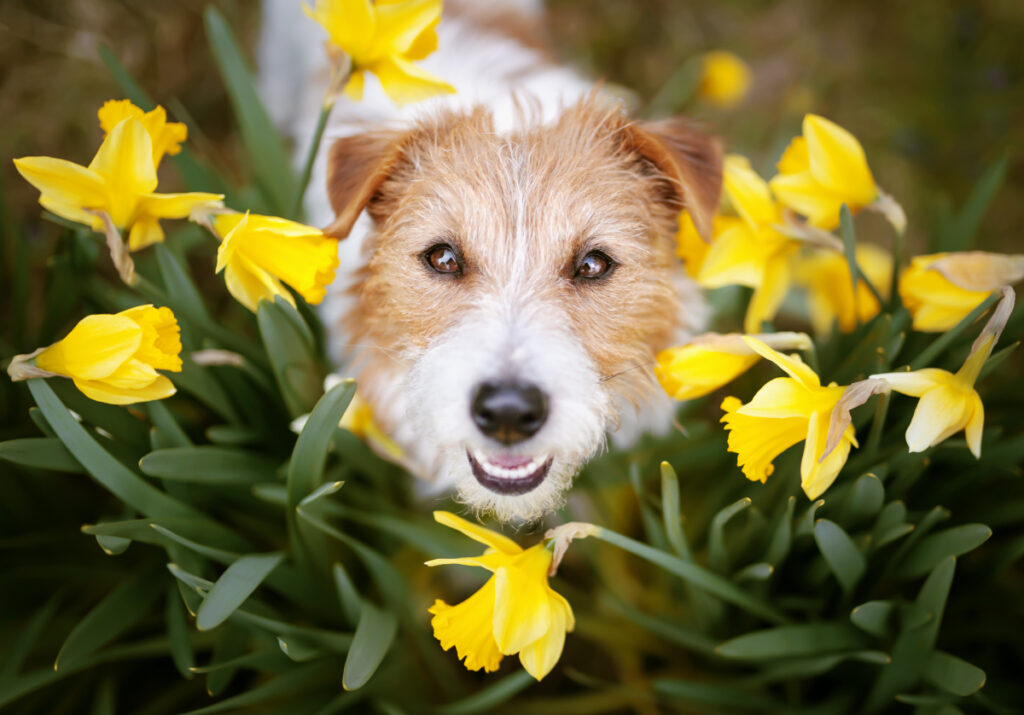Pet Safe Flowers for Spring and Summer Bouquets
Certainly, most people would agree that a bouquet of fresh spring or summer flowers adorning the kitchen table is an essential decoration for the warmer seasons. One thing some people are not aware of is the fact that you must take caution in the selection of flowers you include in any decorative flower arrangement. Some flowers are simply irritating to your pet’s stomach. However, others can cause severe toxic reactions that may lead to organ failure.

Flowers to avoid:
Lilies:
Of the most dangerous bouquet flowers, ones that should be avoided at all costs, are those in the “true” lily and “daylily” families. All parts of the plant are toxic, even the water in the vase containing the flowers or pollen your cat might lick off their fur. The toxic component of lilies is unknown but kidney failure progressing to death may occur within 3 days of exposure. For a list of the most toxic to least toxic lilies, follow this link: Lovely Lilies and Curious Cats: A Dangerous Combination | FDA
Daffodils:
Daffodils are mild to moderately toxic. Their toxic components include crystalline lycorine and other alkaloids. All parts of the plant are toxic, but the largest concentration of alkaloids is found in the bulbs. In general, eating daffodils usually causes mild to moderate GI upset. However, larger ingestions, especially of bulbs, may cause seizures/tremors, low blood pressure, and cardiac arrhythmias.
Tulips and Hyacinth:
These flowers belong to the Liliaceae family. Toxic allergenic lactones or similar alkaloids are highly concentrated in the bulb of the plant. Dogs have been known to consume large amounts of freshly planted bulbs leading to severe GI upset, and other signs such as increased heart rate and respiratory difficulty. Chewing on a small amount of the plant itself is not likely to cause severe signs but your pet may experience mild to moderate vomiting and diarrhea.
Foxglove and related flowers:
Foxglove and numerous related flowers (Dogbane, Milkweed, Lily of the Valley, Oleander, Star of Bethlehem) contain naturally occurring poisons known as cardiac glycoside toxins that affect the heart. These toxins directly affect the heart muscle and can impact heart rate and rhythm, disturb electrolyte balance, and cause GI and neurologic signs.
Safe flowers for a beautiful bouquet:
The ASPCA poison control website provides information on 12 pet-safe flowers that will help you put together beautiful bouquets to enjoy throughout the Spring and Summer. The list of flowers includes roses, orchids, Gerber daisies and sunflowers, true seasonal favorites. Refer to this link for the full list of pet-safe flowers: Mother’s Day Bouquets: What’s Safe for Pets? | ASPCA
General safety and information:
Even plants and flowers considered “safe” may cause mild GI distress if consumed as pets cannot digest plant material well. If you notice your pet is chewing on plants labeled safe, use common sense and place the plants out of reach. If you notice your pet has consumed a toxic plant, it is far better to discuss the situation with an expert on the subject such as:
- The ASPCA Pet Control Animal Poison Control | (888) 426-4435 | ASPCA
- Pet Poison Helpline Pet Poison Helpline
Please do not hesitate to call our office with any concerns you may have. However, we will ultimately refer you to the poison hotline veterinary specialists to formulate a treatment plan tailored to your pet and the toxic plant consumed. Stay safe, and stop to smell the flowers this summer!
